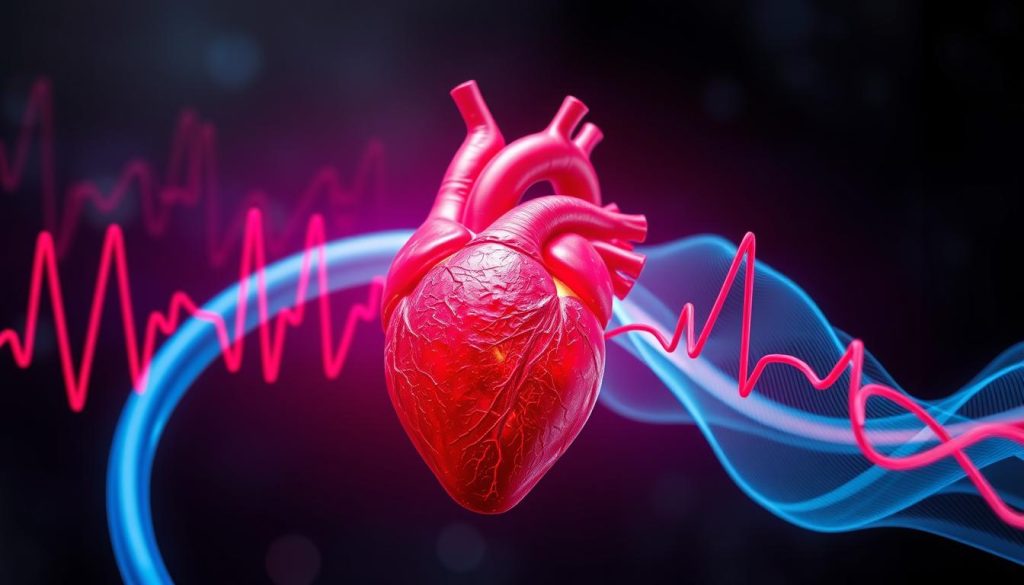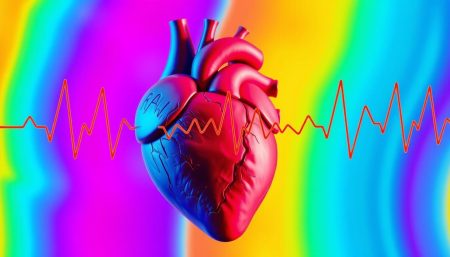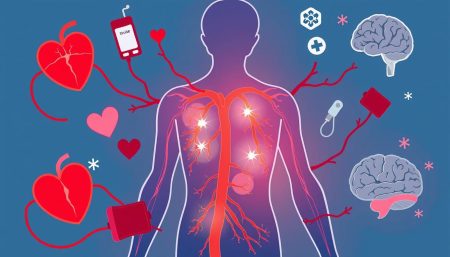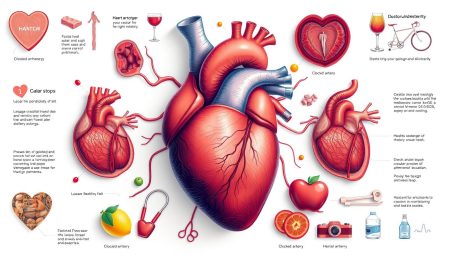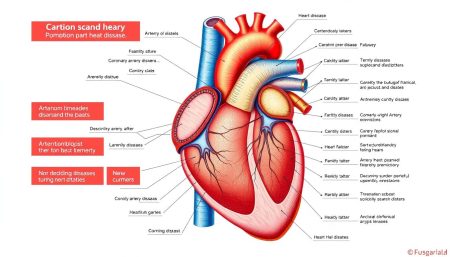High blood pressure, or hypertension, is a big threat to heart health. It’s not a cardiovascular disease itself but is a strong risk factor for serious heart issues. Knowing how hypertension affects heart disease is key to keeping our hearts healthy.
Hypertension quietly harms blood vessels and organs over time. It’s called the “silent killer” because many don’t know they have it until it’s too late. Recent studies show that even slightly high blood pressure can raise the risk of heart problems.
It’s important to recognize and manage high blood pressure to avoid heart disease. By understanding this link, we can protect our heart health and lower the risk of serious issues. Let’s look at how hypertension affects the heart and why controlling blood pressure is so critical.
Understanding the Relationship Between Hypertension and Cardiovascular Disease
Managing blood pressure is key to keeping your heart healthy. Hypertension and cardiovascular disease are closely linked, affecting many Americans. Let’s dive into this connection and its effects on our health.
Defining Blood Pressure and Its Components
Blood pressure is the force blood exerts on artery walls. It has two main parts:
- Systolic pressure: When the heart beats
- Diastolic pressure: When the heart rests between beats
Grasping these parts is essential for managing blood pressure and heart health.
The Impact of Blood Pressure on Heart Function
High blood pressure puts strain on the heart, leading to heart problems. It can cause:
- Thickening of heart muscle
- Narrowing of blood vessels
- Increased risk of heart attack and stroke
Classification of Blood Pressure Levels
Knowing your blood pressure category is vital for managing hypertension. Here’s a guide:
| Category | Systolic (mm Hg) | Diastolic (mm Hg) |
|---|---|---|
| Normal | Less than 120 | Less than 80 |
| Elevated | 120-129 | Less than 80 |
| Stage 1 Hypertension | 130-139 | 80-89 |
| Stage 2 Hypertension | 140 or higher | 90 or higher |
| Hypertensive Crisis | Higher than 180 | Higher than 120 |
Regular checks and understanding these levels are key to heart health and avoiding hypertensive disorders’ complications.
Is High Blood Pressure a Cardiovascular Disease?
Many people think high blood pressure is a heart disease. But it’s actually a big risk factor for heart disease. It quietly damages blood vessels and organs, leading to serious heart problems.
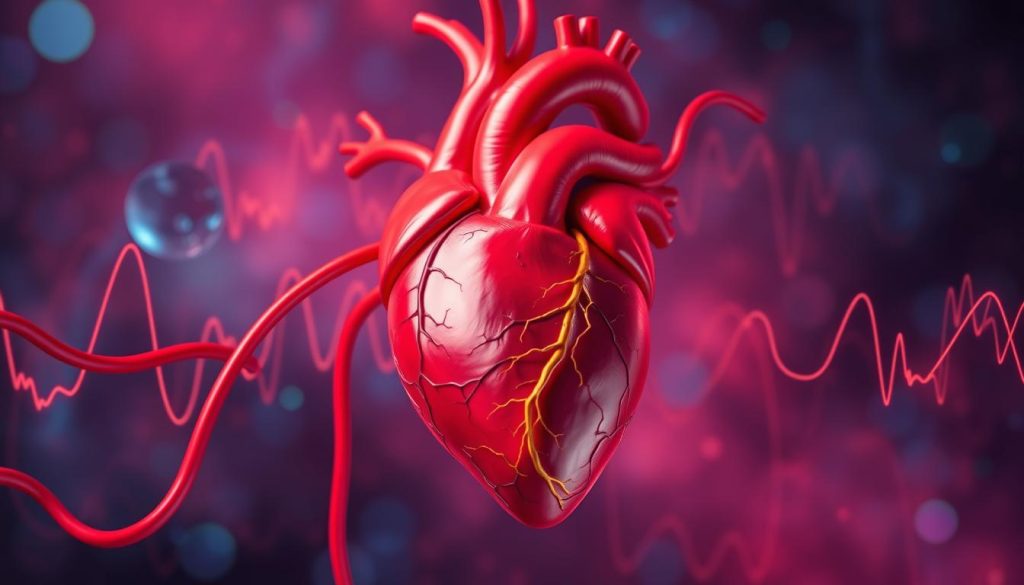
The link between high blood pressure and heart disease is complex. High blood pressure makes the heart work too hard. This can damage the heart muscle, causing it to thicken.
Even though it’s not a heart disease, high blood pressure is very serious. It’s often called a “silent killer” because it has no symptoms until it’s too late. Getting your blood pressure checked regularly is key to catching problems early.
“Hypertension is like a ticking time bomb for your cardiovascular system. It’s not the explosion itself, but it sets the stage for potentially devastating consequences.”
It’s important to know the difference between high blood pressure and heart diseases. High blood pressure increases the risk of heart conditions. By keeping your blood pressure in check, you can lower your risk of serious heart problems.
- Hypertension is a leading risk factor for heart disease
- It causes gradual damage to blood vessels and organs
- Regular monitoring is key to preventing cardiovascular issues
While high blood pressure isn’t a heart disease, it’s a serious condition. It needs attention and management to keep your heart healthy.
The Silent Nature of Hypertension as a Leading Risk Factor
Hypertension, or high blood pressure, is a major risk for heart disease. It’s often not noticed until it’s too late. Knowing about it is key to managing blood pressure and preventing problems.
Why Hypertension Is Called the Silent Killer
Hypertension doesn’t show symptoms early on. Many people with it feel normal, not knowing the harm it’s causing. That’s why it’s important to check blood pressure regularly.

Early Warning Signs to Watch For
Even though hypertension is often without symptoms, some people might notice slight signs. These include:
- Mild headaches
- Shortness of breath during light activity
- Unexplained fatigue
- Slight dizziness
Spotting these signs early can lead to timely treatment and help avoid bigger heart problems.
Common Symptoms of Severe Hypertension
When hypertension gets severe, symptoms become more obvious:
| Symptom | Description |
|---|---|
| Severe headaches | Often described as pounding, usually in the morning |
| Vision problems | Blurred or double vision |
| Nosebleeds | Frequent or unexplained |
| Chest pain | May indicate heart strain or damage |
If you experience these symptoms, seek medical help right away. Regular blood pressure checks and preventive steps are vital for managing this silent but serious risk.
How High Blood Pressure Damages Your Cardiovascular System
High blood pressure quietly harms your heart and blood vessels. It makes your heart work too hard, leading to heart problems. Over time, blood vessels become stiff and narrow, causing serious issues.
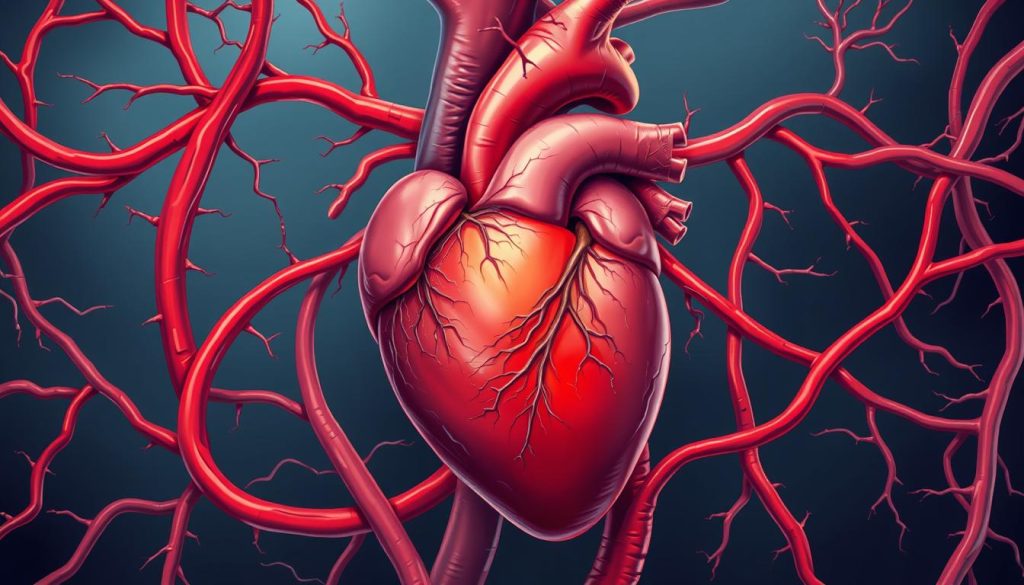
High blood pressure also hurts your arteries. They get tiny tears that heal with scar tissue. This makes arteries narrow and increases the risk of blockages.
High blood pressure can make your heart muscle thicken. This might seem good, but it actually makes your heart less efficient. This condition, called left ventricular hypertrophy, is a big risk for heart failure.
“Uncontrolled hypertension is like a ticking time bomb for your cardiovascular health. It’s vital to tackle it early to avoid lasting damage.”
High blood pressure also harms your kidneys, eyes, and brain. It can damage kidney blood vessels, making them less effective. In your eyes, it can cause vision problems by damaging the retina’s blood vessels. Your brain is at risk too, with a higher chance of stroke and cognitive decline.
Knowing how high blood pressure affects your body is key. Regular check-ups and lifestyle changes can help protect your heart. They can also prevent many cardiovascular problems linked to high blood pressure.
Risk Factors Contributing to Hypertensive Disorders
Knowing about cardiovascular risk factors is key to a healthy life. Hypertensive disorders come from many sources. This includes genetics and daily habits.
Genetic and Family History Factors
Your genes affect your risk for high blood pressure. If your family has hypertension, you might too. Knowing your family’s health history is very important.
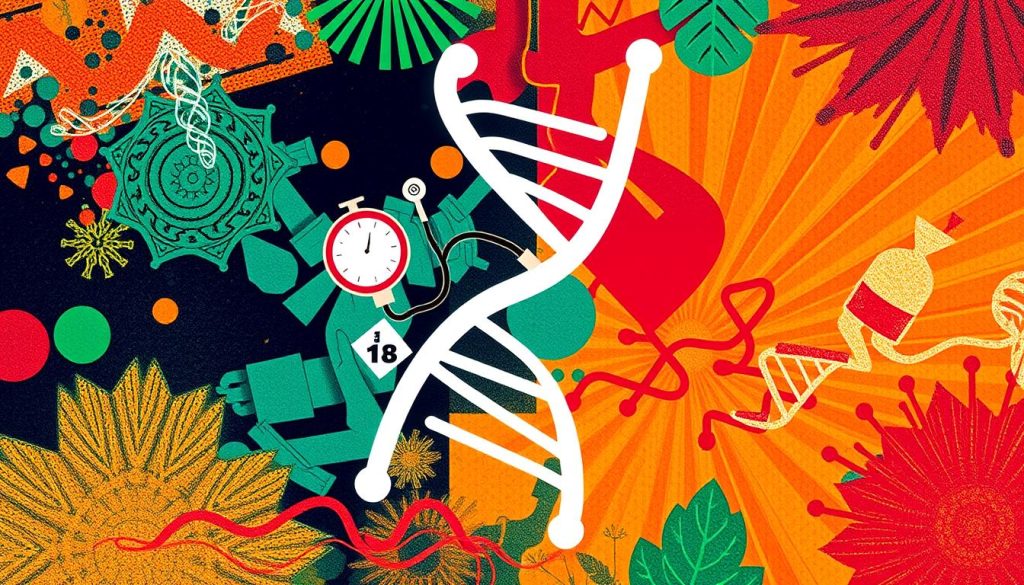
Lifestyle-Related Risk Factors
Your daily choices affect your blood pressure. Eating too much salt and fat, not moving enough, and drinking too much alcohol raise your risk. A healthy lifestyle is a strong defense against heart disease.
- High-sodium diet
- Sedentary lifestyle
- Smoking
- Excessive alcohol intake
Medical Conditions That Increase Risk
Some health issues raise your risk of high blood pressure. These include obesity, diabetes, and kidney disease. Managing these conditions is vital for heart health.
“Prevention is better than cure. Identifying and addressing cardiovascular risk factors early can significantly reduce your chances of developing hypertension.”
Understanding these risk factors helps you live a heart-healthy life. Small changes in your daily life can make a big difference in your heart health.
Measuring and Monitoring Blood Pressure Effectively
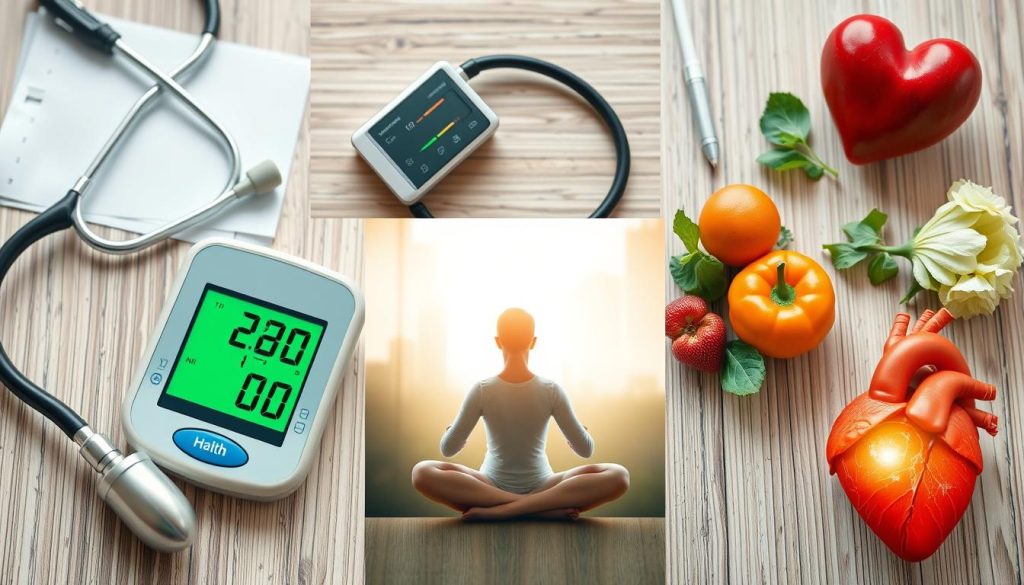
Getting your blood pressure right is key for heart health. Regular checks spot problems early. This lets you take action before they get worse. Here’s how to measure and track your blood pressure right.
Monitoring at home is important for blood pressure care. Many people get motivated to check their health, like blood pressure, after learning about their genetic risks. This is shown by research on Alzheimer’s disease.
To get accurate readings:
- Sit quietly for 5 minutes before measuring
- Use a properly-sized cuff
- Keep your arm at heart level
- Take readings at the same time daily
- Record all results for your doctor
Avoid mistakes like talking while measuring or using the wrong cuff size. These mistakes can give wrong results. They might hide heart health problems.
“Regular blood pressure monitoring is a simple yet powerful tool for maintaining cardiovascular wellness.”
Blood pressure changes all day. Taking many readings and averaging them gives a true picture of your heart health. By following these steps, you’re helping keep your heart healthy.
Complications and Long-term Effects of Untreated Hypertension
Untreated high blood pressure can cause serious health problems over time. This condition often goes unnoticed, leading to damage in various organs and systems.
Heart-Related Complications
High blood pressure strains the heart, raising the risk of heart disease. This can include heart attacks and heart failure. The heart muscle thickens, making it harder to pump blood.
Impact on Other Organs
Hypertension affects more than just the heart. It can harm blood vessels, impacting many organs:
- Kidneys: Reduced blood flow can lead to kidney damage or failure
- Brain: Increased risk of stroke and cognitive decline
- Eyes: Damage to blood vessels in the retina, potentially causing vision problems
Quality of Life Changes
Chronic hypertension can greatly affect daily life. People may feel:
| Symptom | Impact on Quality of Life |
|---|---|
| Fatigue | Reduced energy for daily activities |
| Headaches | Difficulty concentrating at work or school |
| Dizziness | Increased risk of falls, specially in older adults |
| Anxiety | Constant worry about health complications |
Knowing these risks shows why early detection and treatment of high blood pressure are key. They help prevent long-term health problems and keep quality of life high.
Treatment Options for Managing High Blood Pressure
Managing high blood pressure is key for heart health. A mix of lifestyle changes and medical treatments can help control blood pressure. Let’s look at some effective ways to manage blood pressure.
Lifestyle changes are important for controlling high blood pressure. These include:
- Eating a balanced diet low in sodium and rich in fruits and vegetables
- Regular exercise, aiming for at least 150 minutes of moderate activity per week
- Limiting alcohol consumption
- Quitting smoking
- Managing stress through relaxation techniques
If lifestyle changes aren’t enough, doctors may prescribe medications. Common types include:
| Medication Class | How It Works | Examples |
|---|---|---|
| ACE Inhibitors | Relax blood vessels | Lisinopril, Enalapril |
| Beta Blockers | Slow heart rate | Metoprolol, Atenolol |
| Diuretics | Remove excess sodium and water | Hydrochlorothiazide, Furosemide |
| Calcium Channel Blockers | Relax blood vessel walls | Amlodipine, Diltiazem |
Your doctor will create a treatment plan just for you. Regular check-ups are key to monitor progress and adjust treatment if needed. Remember, keeping blood pressure in check is vital for heart health and preventing heart disease.
“Taking control of your blood pressure is one of the most important steps you can take for your heart health.”
By combining preventive measures with the right medical care, you can manage your blood pressure well. This reduces your risk of heart disease.
Lifestyle Modifications for Blood Pressure Control
Controlling your blood pressure is easier than you think. Simple changes can greatly improve your heart health. Let’s look at some effective ways to manage your blood pressure better.
Dietary Approaches to Stop Hypertension (DASH)
The DASH diet is a great way to lower blood pressure. It focuses on eating more fruits, veggies, whole grains, and lean proteins. It also limits salt, sugar, and unhealthy fats.
By following DASH, you can enjoy a balanced diet that’s good for your heart.
Exercise and Physical Activity Guidelines
Exercise is key for a healthy lifestyle and blood pressure control. Aim for 150 minutes of moderate activity each week. This can be brisk walking, swimming, or cycling.
Start slow and increase your activity level over time. Remember, any exercise is better than none for your heart.
Stress Management Techniques
Chronic stress can harm your blood pressure. It’s important to find ways to relax and unwind. Try deep breathing, meditation, or yoga to calm your mind and body.
Enjoying hobbies or spending time in nature can also reduce stress. These simple methods can be powerful in managing your blood pressure.
FAQ
Q: Is high blood pressure considered a cardiovascular disease?
A: High blood pressure, or hypertension, is not a cardiovascular disease itself. It’s a major risk factor for heart and blood vessel diseases. Over time, it can damage the heart and blood vessels, raising the risk of heart disease, stroke, and other problems.
Q: What are the normal blood pressure levels?
A: Normal blood pressure is below 120/80 mmHg. Here’s a breakdown of blood pressure categories:
• Normal: Less than 120/80 mmHg
• Elevated: 120-129/less than 80 mmHg
• Hypertension Stage 1: 130-139/80-89 mmHg
• Hypertension Stage 2: 140/90 mmHg or higher
• Hypertensive Crisis: Higher than 180/120 mmHg
Q: Why is hypertension called the “silent killer”?
A: Hypertension is called the “silent killer” because it often has no symptoms in the early stages. Many people with high blood pressure feel fine, unaware of the damage to their heart and blood vessels. Regular blood pressure checks are key to catching it early and preventing serious health issues.
Q: What are some early warning signs of high blood pressure?
A: While hypertension is often without symptoms, some early signs include:
• Headaches, often in the morning
• Dizziness or feeling lightheaded
• Shortness of breath
• Nosebleeds
• Changes in vision
• Feeling tired
These symptoms can also mean other health issues. Regular health check-ups are the best way to spot high blood pressure early.
Q: How does high blood pressure damage the cardiovascular system?
A: High blood pressure harms the heart and blood vessels in several ways:
• Arterial damage: Makes arteries less flexible and narrower
• Increased heart workload: Forces the heart to pump harder
• Atherosclerosis: Helps plaque build up in arteries
• Weakening of blood vessels: Can cause aneurysms or ruptures
• Organ damage: Affects organs like the kidneys, brain, and eyes
These effects increase the risk of heart attacks, strokes, and other cardiovascular issues.
Q: What are the main risk factors for developing hypertension?
A: The main risk factors for hypertension include:
• Age: Risk increases with age
• Family history: Genetic predisposition
• Race: More common in African Americans
• Obesity: Excess weight strains the heart
• Sedentary lifestyle: Lack of physical activity
• High-sodium diet: Excessive salt intake
• Excessive alcohol consumption
• Chronic stress
• Certain medical conditions: Such as diabetes and kidney disease
• Smoking: Damages blood vessels and increases heart rate
Q: How often should I measure my blood pressure?
A: The frequency of blood pressure measurements varies based on your health and risk factors. Generally:
• For adults with normal blood pressure: At least once every 2 years
• For those with elevated blood pressure or risk factors: More frequently, as advised by a healthcare provider
• For individuals diagnosed with hypertension: Regular home monitoring may be recommended, with frequency determined by your doctor
Always follow your healthcare provider’s specific recommendations for blood pressure monitoring.
Q: What are the long-term effects of untreated hypertension?
A: Untreated hypertension can lead to severe complications, including:
• Heart attack and heart failure
• Stroke
• Aneurysms
• Kidney damage or failure
• Vision problems or loss
• Cognitive decline and dementia
• Peripheral artery disease
These complications can significantly impact quality of life and may be life-threatening. Early detection and proper management of hypertension are key to preventing these long-term effects.
Q: What lifestyle changes can help manage high blood pressure?
A: Effective lifestyle modifications for managing high blood pressure include:
• Adopting the DASH (Dietary Approaches to Stop Hypertension) diet
• Reducing sodium intake
• Increasing physical activity (aim for at least 150 minutes of moderate exercise per week)
• Maintaining a healthy weight
• Limiting alcohol consumption
• Quitting smoking
• Managing stress through techniques like meditation or yoga
• Getting adequate sleep
These changes, combined with medication if prescribed, can significantly improve blood pressure control and overall cardiovascular health.












